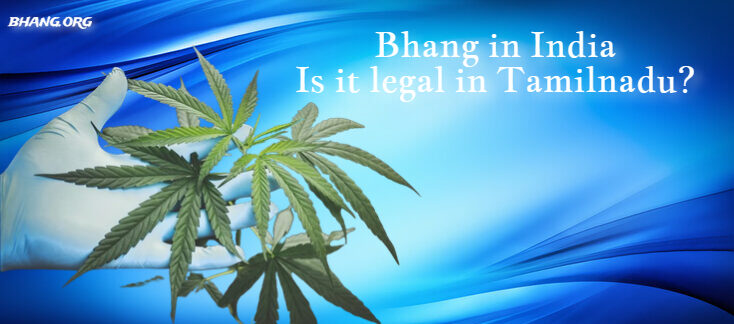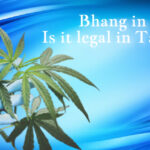Bhang in Tamilnadu, India: It’s indeed intriguing how India, despite imposing high taxes of 28% on tobacco products and 18% on alcohol, allows the sale of a drug openly through government-licensed shops. The historical and cultural context surrounding the use of cannabis, particularly its derivative called Bhang, sheds light on this unique scenario.
What is Bhang?
Bhang, as defined by the NDPS policy governing its usage, is an edible preparation made from the leaves of the Cannabis sativa plant. Cannabis contains powerful constituents like cannabinoids, terpenes, and flavonoids, with THC (tetrahydrocannabinol) being one of the most notable. When THC content exceeds 0.3%, the cultivar develops psychoactive properties, resulting in a ‘high’ upon consumption. Bhang, along with other cannabis derivatives like charas, hashish, and ganja, is made from such cultivars with higher THC content, specifically from the leaves and sometimes flowering parts of the cannabis plant.
Historical Significance in India:
India’s relationship with cannabis dates back centuries, with widespread cultivation across various regions. Bhang became ingrained in social rituals, religious rites, and daily life, especially during festivals and social gatherings. Its popularity soared due to its perceived cooling properties during the scorching summer months.
Religious Connections and Contentions:
In Sikhism, while intoxicants are strictly prohibited, certain sects like the Nihangs continue to consume Bhang, considering it sacred. In Hinduism, Bhang is associated with Lord Shiva and is consumed during festivals like Holi and Shivratri. Islamic literature from the post-9th century acknowledges the properties of Bhang, although its use remains a contentious issue. In Buddhism, different schools have varying stances on intoxicants, with some interpretations allowing for the medicinal use of Bhang.
Legal Position in India:
India’s legal stance on cannabis is shaped by international conventions, leading to the enactment of the NDPS Act in 1985. While the act prohibits substances like charas and ganja, Bhang, made from cannabis leaves, falls outside its purview. The National Policy on Narcotic Drugs and Psychotropic Substances regulates the cultivation and use of Bhang, allowing its consumption under certain conditions.
Why did the NDPS Act exempt leaves and prohibit other parts?
The legislature excluded seeds and leaves of the cannabis plant from the Act’s scope because the notched leaves have minimal THC content, making Bhang the least potent of all cannabis preparations in India. This decision can be traced back to colonial times when the British conducted extensive studies on the effects of cannabis on India’s native population. Years of research, surveys, and interviews with psychiatrists and doctors from India and Britain culminated in the Indian Hemp Drugs Commission Report. One of the report’s ironic conclusions was that banning Bhang would be unjustified due to its religious and cultural significance in India. Additionally, it was deemed less harmful than alcohol or tobacco, considering India’s socio-cultural context.
Is bhang legal in Tamilnadu?
The Tamil Nadu government is actively considering allowing the cultivation of hemp for industrial and medical purposes, as the demand for hemp and its value-added products continues to grow.
The State Planning Commission convened a meeting to discuss “enhancing hemp cultivation in Tamil Nadu” and tasked the Tamil Nadu Agriculture University with preparing a feasibility report.
In a letter dated May 31, State Planning Commission member secretary TS Rajsekar wrote to the agricultural production commissioner and secretary of the agriculture and farmers’ welfare department to assess the feasibility of hemp cultivation in Tamil Nadu’s agroclimatic conditions, particularly in terms of utilizing fallow land.
Hemp and marijuana (ganja) are both part of the cannabis species and may look identical, but they have distinct properties that differentiate their uses.
Hemp is nonpsychoactive with lower tetrahydrocannabinol (THC) levels, typically ranging between 0.3 and 1 per cent. It has various industrial and economic applications that could benefit farmers. Marijuana, on the other hand, contains higher levels of THC, ranging from 5 to 35 per cent, and is mainly used to produce banned narcotic drugs.
However, both species are treated similarly under the Narcotic Drugs and Psychotropic Substances Act, 1985 (NDPS Act), despite hemp’s numerous benefits.
Vasudha Chakravarthi, an independent cannabis researcher from the Nilgiris, who advocated for licensed hemp cultivation in Tamil Nadu, stated that hemp is a fast-growing and low-maintenance crop, making it environmentally friendly.
“The fibre extracted from hemp stalk is utilized in the textile industry, and various oils made from hemp seeds are considered highly nutritious. The fibrous material extracted from the leaves can be utilized in the production of paper, construction materials, and more. Additionally, hemp contains high levels of the medicinal alkaloid cannabidiol (CBD), which is widely used by cosmetic and pharmaceutical companies,” she explained.
Vasudha recently extracted CBD oil from hemp obtained from Uttarakhand, where cultivation is legal, and used it on chronically-ill elephants with permission from the forest department. The animals showed signs of improvement. Multiple WHO reports have highlighted CBD’s therapeutic benefits for various mental disorders, including Alzheimer’s, depression, anxiety, and cancer.
Sultan Ahmed Ismail, a member of the State Planning Commission, stated, “Considering the potential benefits hemp offers, we have requested the agriculture department to provide its feedback.”
“Clinical trials and field experiments need to be conducted by competent authorities, such as the agriculture university and horticulture department, to determine the suitability of hemp cultivation in Tamil Nadu. We must also be mindful of legal implications. Once we receive the feasibility report, the State Planning Commission will offer its recommendations to the State government,” he added.
Delzaad Deolaliwala, co-founder and director of Bombay Hemp Company and chairman of the Pan India Medical Cannabis & Hemp Association, mentioned that Sections 10 (iii) and 14 of the NDPS Act empower State governments to permit and regulate the cultivation of any cannabis plant for industrial and medical purposes. However, most State governments are hesitant to formulate policies in this regard.
Recently, in response to a petition filed in the Delhi High Court, the Union government stated that State governments can “permit, control, regulate the cultivation of any cannabis plant, production,The production, possession, transportation, or utilization of cannabis (excluding hashish) for medical, scientific, and industrial intentions.”
The affidavit filed by the Director of Narcotics Control stated that there is no total prohibition on cannabis under the NDPS Act. However, it can be utilized for medical, scientific, industrial, and horticultural purposes by obtaining the required permissions from the respective State governments.
How is Bhang consumed?
Bhang is typically consumed as an edible preparation, often blended with nuts, herbs, and spices to make milkshakes like thandai or lassi. It can also be consumed in the form of Bhang golis/balls, freshly ground mixtures of Bhang and water, or used as an ingredient in sweets like Bhang Besan Halwa and beverages like Bhang masala tea or pakoras (Indian fritters). In the Himalayan regions, it is consumed as a chutney with tomatoes and mint. Besides its recreational value due to THC content, Bhang is also consumed for its anti-inflammatory and anti-phlegmatic properties.
Medicinal use of Bhang:
Ayurveda:
Even during the Vedic Age, Bhang’s anesthetic and anti-phlegmatic properties were known. Over time, Ayurveda recognized its therapeutic properties and recommended its use after purification. Bhang is mentioned in ancient texts like the Atharva Veda, Sushruta Samhita, and Bhava Prakasha. It has been studied for its efficacy in treating various ailments, including digestive issues, muscular pains, skin infections, inflammation, and insomnia. The essential oil of Bhang has also shown antimicrobial properties.
Unani System:
In the Unani system of medicine, Bhang is considered essential, known for its aphrodisiac, retentive, hypnotic, and sedative properties.
Homeopathy:
While homeopathy primarily uses the flowering part of the cannabis plant, it has found applications in treating personality disorders, mental disorders, hallucinations, memory loss, and pain.
Allopathy:
Although there’s limited research on Bhang’s benefits in allopathic medicine, THC, found in Bhang, has been studied for various medical conditions like nausea, vomiting, epilepsy, glaucoma, cancer, and HIV/AIDS.
Recreational Aspect:
Bhang, when administered in small doses under guidance, is relatively safe, offering relaxation. However, some use it for its potential to induce a ‘high,’ which requires careful dosage and concentration. Excessive intake can lead to complications, including confusion, dry mouth, fatigue, anxiety, mood changes, increased heart rate, dizziness, headaches, and, in rare cases, hallucinations, paranoia, panic attacks, nausea, and vomiting. Nonetheless, the medicinal use of Bhang is considered safe and offers numerous health benefits, including acting as an antidepressant, painkiller, weight loss aid, skin treatment, anti-cancer agent, anti-nausea remedy, and more.
If you’re interested in exploring, here are a few places that offer Bhang beverages and delicacies:
- Off Limits Coffee in Kasol serves Bhang coffee.
- The Hemp Cafe in Pune offers one of their specialties, the ‘Bhang ka sandwich.’
- Hemp Station in Calicut specializes in hemp seed milkshakes.
- Doctor Bhang in Jaisalmer.
- Special Lassi in Pushkar.
- Gopa Chowk in Jaisalmer.
- Blue Lassi Shop in Varanasi.
- Sarkari Theka Bhang in Mathura.
- Theka Bhang at Assi Ghat in Varanasi.
- Hippie Island in Hampi.
- Hatibagan in Kolkata.
Conclusion:
India’s stance on Bhang reflects a complex interplay of historical, cultural, and legal factors. While it remains regulated, efforts to explore its industrial and medical potential, as seen in Tamil Nadu, highlight evolving attitudes towards cannabis. As research progresses, a nuanced understanding of Bhang’s benefits and risks is essential for informed policymaking.
FAQs about Bhang in Tamilnadu, India
What is Bhang, and how is it different from other cannabis derivatives?
Bhang is an edible preparation made from the leaves of the Cannabis sativa plant. Unlike other cannabis derivatives like charas and ganja, which are made from parts with higher THC content, Bhang is typically made from leaves with minimal THC, making it less potent.
What are the historical and cultural associations of Bhang in India?
Bhang has deep-rooted historical and cultural significance in India, dating back centuries. It is integral to social rituals, religious rites, and festivals like Holi and Shivratri. Various religious texts and traditions also mention Bhang’s association with deities and spiritual practices.
Is Bhang legal in India?
Yes, Bhang is legal in India under certain conditions. While substances like charas and ganja are prohibited under the Narcotic Drugs and Psychotropic Substances Act, Bhang, made from leaves with minimal THC, falls outside its scope. However, regulations govern its cultivation, production, and consumption.
What are the medicinal properties of Bhang?
Bhang is valued for its medicinal properties, including anti-inflammatory, anti-phlegmatic, and pain-relieving effects. It has been used in traditional Ayurvedic, Unani, and homeopathic medicine for treating various ailments like digestive issues, muscular pains, skin infections, and insomnia.
How is Bhang consumed, and what are its recreational and medicinal uses?
Bhang is typically consumed as an edible preparation, blended into milkshakes like thandai or lassi, or used in sweets and beverages. Its recreational use stems from its psychoactive properties, offering relaxation and euphoria. Additionally, Bhang is valued for its medicinal benefits, including its use as an antidepressant, painkiller, and anti-nausea remedy.





Leave a Reply